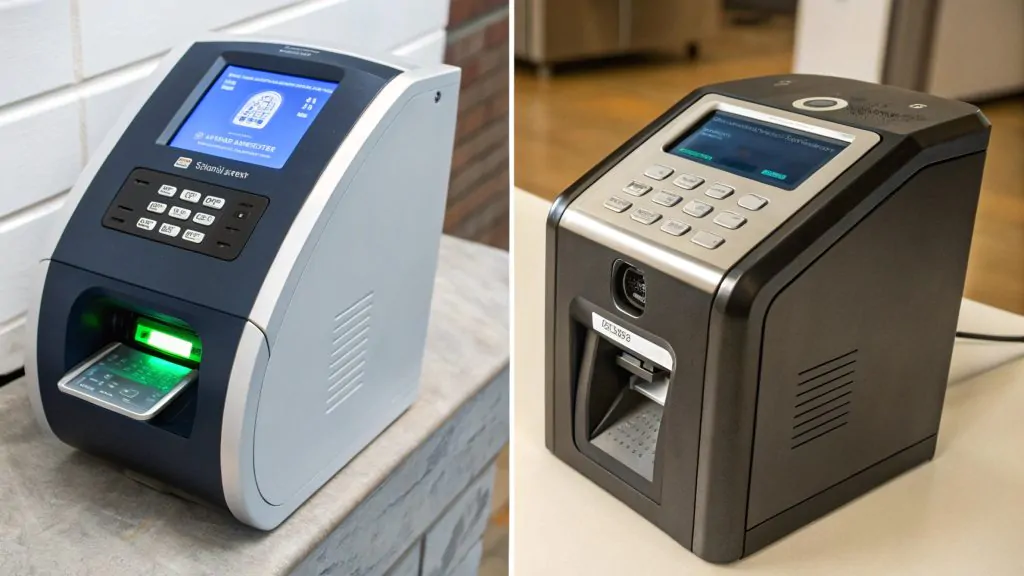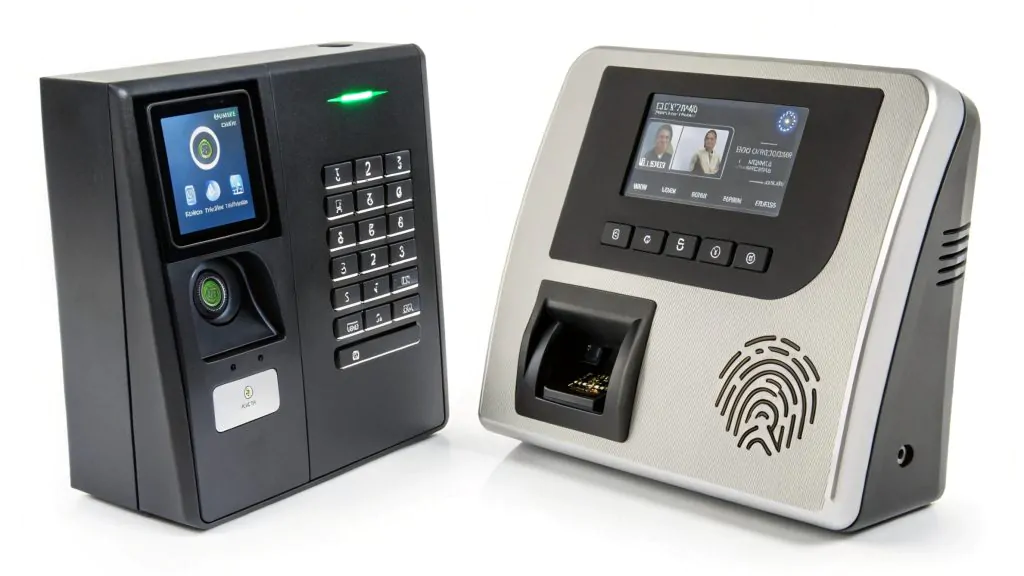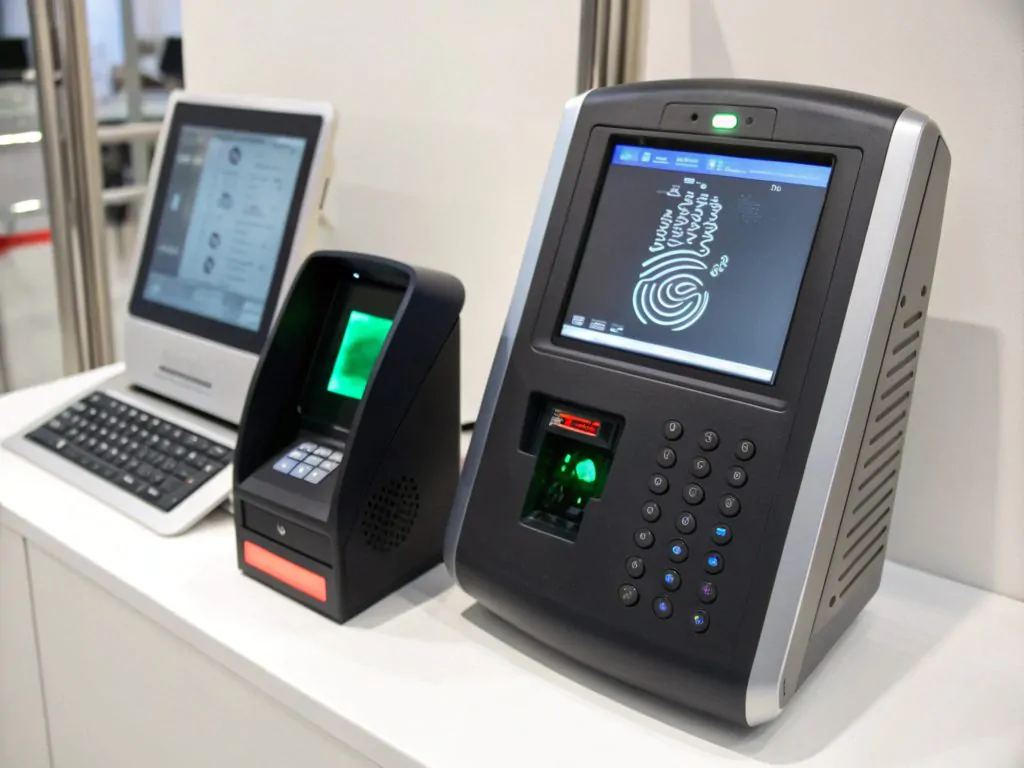Are you wondering which is better for you—biometrics or traditional fingerprint scanning? Both have their pros and cons. Let’s explore the differences to help you decide.
Biometric fingerprint scanners offer higher security and convenience, but they come with a higher price tag and privacy concerns. Traditional fingerprint scanners are cheaper, but may lack the same level of security and accuracy.

When I switched to biometric fingerprint scanning, I noticed how much faster and more convenient it was. But, the cost made me pause. Let’s look deeper into each option to see what works best for you.
[Table of contents]
What is the Difference Between Biometrics and Fingerprint Scanning?
If you’re unsure about whether fingerprint scanning is part of biometric technology, you’re not alone. Let’s break down the key differences and explain what makes biometric systems so secure.
Biometric systems use various physical traits like fingerprints, facial features, and even eye scans to verify identity. Fingerprints are just one example of biometrics used for identification.
Understanding Biometrics vs Fingerprint Scanning
Biometrics is an umbrella term that includes various types of physical characteristics used for security purposes. Fingerprints, face recognition, and iris scans are all examples of biometric identifiers. I used to think of biometrics only as fingerprint scanning, but it’s much broader than that.
While fingerprint scanning uses the unique patterns on your finger to verify your identity, biometrics takes it further by using multiple identifiers for a more secure and accurate system. For instance, facial recognition adds an additional layer of security, something that traditional fingerprint scanners can’t offer.
| Feature | Biometrics | Traditional Fingerprint Scanners |
|---|---|---|
| Security | High (multiple traits) | Medium (single trait) |
| Speed | Fast | Moderate |
| Cost | High | Low |
| Privacy Concerns | High (data storage risks) | Low (no data storage) |
Which is More Secure: Biometrics or Traditional Fingerprint Scanning?
Let’s talk about security. Is biometric fingerprint scanning truly more secure than traditional fingerprint scanners? Here’s what I discovered.
Biometric fingerprint scanners are more secure than traditional methods like passwords or PINs. They use unique physical traits, making them much harder to replicate or hack.
Why Biometrics Are More Secure
Biometric systems offer a level of security that traditional fingerprint scanners simply can’t match. With biometric authentication, you are using something unique to you, like your fingerprints or facial features, which cannot be easily copied. I remember when I switched to biometrics, I felt safer knowing that my phone would only unlock with my fingerprint—not a password I might forget or someone could guess.
Traditional fingerprint scanners work by matching your fingerprint against a stored image, but their accuracy can sometimes be affected by factors like dirt, smudges, or poor quality prints. Biometrics, on the other hand, are more reliable and can even be combined with other factors, like facial recognition, to increase security.
Are Biometrics More Expensive than Traditional Fingerprint Scanning?
While biometric systems sound more secure, they are also more expensive. Should you pay the extra cost, or will a traditional fingerprint scanner be enough for your needs?
Biometric systems are more expensive due to advanced technology and installation costs. However, traditional fingerprint scanners are much more affordable and can meet basic security needs.

Is It Worth the Cost?
When I first looked at biometric fingerprint scanners, the price was the main concern. The initial cost of the equipment and installation was higher compared to traditional scanners. But after using it, I noticed the added benefits—speed, accuracy, and convenience—made it feel like a worthwhile investment.
Traditional fingerprint scanners are significantly cheaper, making them a budget-friendly option for basic security. If you just need something to unlock your phone or give a little extra security at work, a traditional scanner will likely suffice. However, if you’re dealing with sensitive data or need a more robust security system, the added cost of biometric scanners might be justified.
Are There Any Privacy Concerns with Biometrics?
Even though biometrics offer more security, they come with potential privacy issues. Let’s explore the concerns that come with storing your biometric data.
Biometric data is unique to you and, if compromised, could lead to serious privacy issues. Traditional fingerprint scanners don’t store as much personal data, making them a less risky option in terms of privacy.
Privacy Risks with Biometric Data
Biometric systems require the storage of your personal data, such as fingerprints, face scans, or even iris scans. The main concern is that once this data is compromised, it’s nearly impossible to change. If someone were to steal your fingerprint data, it’s not like changing a password.
On the other hand, traditional fingerprint scanners don’t store this kind of data. They simply use your fingerprint at the moment of scanning, and once the scan is complete, the data isn’t stored. This means there’s less risk of a privacy breach. For those of us who are concerned about data security, this can be a significant advantage of traditional fingerprint scanners.
Can Biometric Authentication Be Hacked or Bypassed?
Many people think biometric authentication is foolproof, but can it actually be hacked? Let’s take a look at whether biometric systems are really as secure as we believe.
While biometric systems are more secure, they are not 100% foolproof. In some cases, fake fingerprints and hacking techniques can bypass biometric authentication, but traditional fingerprint scanners have their own vulnerabilities.
Can Biometrics Be Hacked?
Despite the higher security that biometric systems offer, they are not immune to fraud. Research has shown that it is possible to create fake fingerprints and use them to trick biometric scanners. In one instance, researchers were able to make a mold of a fingerprint and use it to unlock a phone. But this is still quite difficult and requires specialized equipment.
Traditional fingerprint scanners also have their limitations. If a print is too smudged or unclear, the scanner may fail to recognize it. This means both systems have flaws, but biometric systems are generally more advanced in handling various conditions, and multi-factor authentication can further reduce the risk of hacking.
Conclusion
Choosing between biometric and traditional fingerprint scanning depends on your needs. If security and convenience are most important to you, biometrics is the better option. But if budget and basic security are your top concerns, a traditional fingerprint scanner will likely meet your needs.
Privacy concerns with biometric data[^1]
Biometric fingerprint scanning technology[^2]
Benefits of biometric authentication[^3]
[^1]: Understanding privacy concerns helps in making informed decisions about using biometric systems, ensuring data protection.
[^2]: Exploring how biometric fingerprint scanning works can provide insights into its reliability and security features.
[^3]: Learning about the benefits can highlight why biometric authentication is a superior choice for security and convenience.



